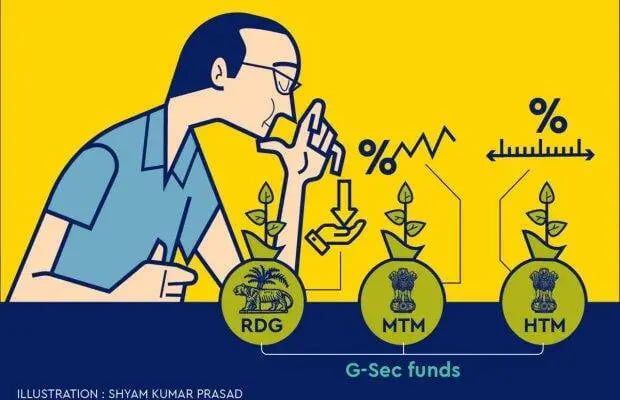If you prefer do-it-yourself, have the wherewithal and bandwidth to execute and want to save on mutual fund expense charges, you can go for RDG.
The recently launched Retail Direct Gilt Account (RDG) Scheme of Reserve Bank of India (RBI) is generating considerable interest among investors. This is an appreciable move by the central bank, allowing retail investors to open an account straight with the RBI rather than with a bank, and giving a service free of charge. However, for the sake of comparison, mutual funds have been around for a long time. We will discuss some of the aspects, so that you are better placed to decide between the two avenues.
Before we proceed, we need to understand Mark-to-Market (MTM) and Hold-to-Maturity (HTM). In an investment with a defined maturity date; for example, a bond, if held till maturity, your returns do not depend on movements in price in the secondary market. As an example, for a five-year maturity bond, if you buy it today and hold it for five years, it does not matter whether bond prices in the market are going up or coming down. This is the concept of HTM; you are insulating yourself from market volatility by holding till maturity.
As against this, in an open-ended debt mutual fund, for example, a Government Securities (G-Sec) Fund, the portfolio will always have a portfolio maturity. Individual securities will mature, but new securities will be purchased. The returns from an open-ended debt fund will move up or down along with the movements in the secondary market. This is the concept of MTM, where your returns are marked to the market movement of that day or that period of time. MTM may work in your favour if prices of bonds move up during your investment tenure and vice versa, if prices come down.
Which one is better?
The RDG is giving you direct access to G-Secs, which so far was only for the “big boys” of the market, the financial institutions. If you prefer Do-It-Yourself (DIY), have the wherewithal and bandwidth to execute and want to save on the running expenses charged by the mutual funds, you can go for RDG. On the other hand, if you prefer the mutual fund package in terms of fund management expertise, diversified portfolio, any-day liquidity in terms of redemption, etc., invest in units of G-Sec funds.
In terms of returns, most mutual funds, including G-Sec funds, are open-ended and are subject to MTM. There are two categories of G-Sec funds, the usual variety and the 10-year constant maturity variety. However, if you hold G-Sec funds for a long time, say 10 years, the volatilities in the market even out and you earn decent returns. In RDG, you can do HTM and insulate from market volatility, by purchasing securities of commensurate maturity as you can hold. You can sell prior to maturity also, based on market movements and your cash flow needs.
Taxation
In terms of taxation, mutual funds have the edge, provided you can hold for three years. This tax efficiency comes by virtue of indexation benefit. You invest in the growth option of the fund, hold for three years or more, and your purchase cost is “indexed up” as per the Cost Inflation Index (CII) numbers announced by the government, and you pay tax only on the net gains.
The rate of long term capital gains tax on debt mutual funds is 20% plus surcharge and cess, but this is applicable only on the indexed gains, and the effective rate is much on the lower side. In RDG, the coupon (interest) on government bonds or any bonds for that matter is taxable at your marginal slab rate, which is usually 30% plus surcharge and cess. Unless you are in a low tax bracket, G-Sec funds are efficient for you, as long as you have a horizon of three years.
Net-net, RDG is for DIY investors while G-Ses funds offer G-Secs as a package.
Source: https://www.financialexpress.com/money/fixed-income-retail-direct-gilt-account-should-you-go-for-it/2373899/


